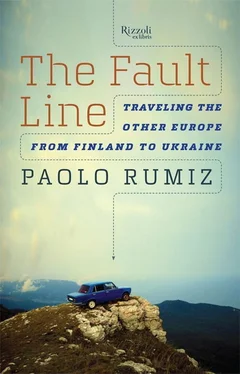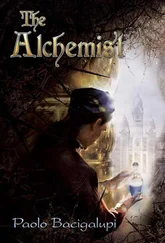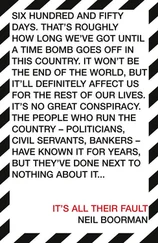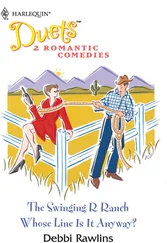We’re back on solid ground and finally arrive at the shore of the lake, still encrusted with ice. Ducks. Tracks of a white hare in the snow. We turn off the engine. Silence. And the reindeer? And the herders? “The Sami are a long way off,” says Vdovin, looking toward the east. In Slavic, Sami, that is, Laplanders, means “loners,” the “solitary ones.” Ivan speaks to me in simple English. A few key words: “Far away, men very far away,” and he points to an invisible line beyond the white mountains. “They know the stories, but they don’t write them down. They only tell them, around a fire.” He says, “They know the stories,” but what he means is, “They know the secrets of life.” Actually, the word reindeer means “life,” because it contains within itself the secret of survival in the void.
The town of Lovozero is not made of little wooden houses, as would seem logical for a people used to living in tents, but of concrete apartment buildings. This is another product of environmental violation. When they were built, in the 1960s, the nomadic Lapps were forced to live in them and to adopt a sedentary lifestyle, with a consequent wave of suicides and alcoholism. Outside a building shaped like an Indian tepee, there is an evangelical service, with guitars and American-style music. Religion completely emptied of magic, reduced to music, morals, responsibility, behavior—the disintegration of the last frontier of mystery. Also the last toehold of a lost people.
When the service ends, a congregation of bony-faced people with watery eyes comes out. An old man with a cane—he barely knows I’m a foreigner—launches into a diatribe against thieves, bad government, and those who have betrayed the dead of the World War. “Today, everything’s going to hell, nobody fixes anything anymore, our houses are falling apart… and Murmansk is a long way off….” He adds, “I’d shoot those people,” and he picks up his cane and holds it like a rifle, takes aim, and squeezes its imaginary trigger. “ Pum, pum. ”
At the Tundra Co-op, which processes and freezes reindeer meat, they confirm that the nomads are far away from the town. “Our herders are out beyond the lake, where the roads don’t go.” And then: “ Dalyeko , far away,” and they make the same quivering gesture that I’d seen Ivan make, to indicate a fascinating and fearsome place off to the east. Who knows, maybe that’s where the real frontier is. Not the political frontier with Finland, which never existed before 1945, but the age-old frontier between the stationaries and the nomads. They go on to add: “That’s where the secret of their culture is, their children are born there, in the huts and tents. They come here when they’re seven years old, when they are already men, to go to school.”
But here are Vitaly Startsev and his wife, Tatiana, pioneers of Arctic grazing.
He is a fast-talking self-assertive guy full of pugnacious vitality. She is small, determined, and taciturn. They throw some birch logs on the fire and talk about the winter, about the herds that scatter in the Arctic night beyond the frozen lake for miles and miles, almost copying the geometry of the stars. When you approach one of those droves of down crowned by an entanglement of dead branches—antlers—a thousand glistening eyes take aim at you in the dark. All around, in the heart of darkness of Kola, the last frontier of European Russia, the pastors of the Great North are in hiding, the last caretakers of the reindeer, the symbol of our Christmas.
Tatiana has no doubts: “Those are real men. They’re born in cabins on the tundra, together with the herd, and before going to school they learn to listen to the stories of their elders, to understand the thousand voices of silence, the mysterious signs of the long Northern night, the tracks of predators and the places where yagel grows, the dried silver-green moss on which the animals nourish themselves even in winter, digging under the snow. Only later will they go to the city, with no risk of being spoiled. The years spent on the tundra will already have changed them forever. Go! Go there yourself! There you drink at the font of wisdom, look nature in the face. What could be better than that? Isn’t that civilization, too?” I hear a familiar creaking sound. A window opening to a new journey. A journey to be made as soon as possible.
The Arctic wind blows at ground level from the Urals, from the great plains of the rivers Ob and the Yenisei. It’s excruciatingly cold, yet here there are things worse than winter. Bears, for example, which in April tear the calves to pieces and devour them. Wolves, which capture adult bulls, grabbling them by the tongue after exhausting them with the chase. Or the rosomakha (wolverine), a little devil with the teeth of a vampire capable of decapitating a reindeer in ten seconds. Then the mosquitoes and the horseflies, which suck the blood of men and animals through their mouths and nostrils. But the worst are the gnats, swarms of them attack a single victim, driving him mad. Here, the summer is horrible, that’s why the transhumance is done in reverse: the herds go up in the winter and down in the summer because with the sea breeze there are fewer insects. But the insects and predators, Vitaly assures me, are nothing compared to man.
Since everything in Russia has been put up for sale—forests, rivers, fisheries—the reindeer have been under attack. Even they—symbol of the Nativity—are now the most recent victims of the massacre of our natural resources. Poachers, tourists, the nouveaux riches, motorists, agents of the multinationals—they all come here, and the slaughter ensues. “Today, everything that is nomadic gets in the way of the culture of exploitation. Our seasonality irritates those who want to do business year-round. So the reindeer die off, forgotten, while Moscow and Saint Petersburg, Oslo and Stockholm resonate with Christmas carols and the blasphemous mill of consumption grinds up the billions.”
The cattle raiser tells us how, one day in January, east of Lovozero, a band of Muscovites showed up on snowmobiles, with thermal suits, navigators, satellite phones, and laser precision rifles. First they exterminated a herd just to take the antlers. Then they invaded a herder’s cabin and drank themselves into a stupor, breaking up the furniture to feed the woodstove. “Starting a few years ago, we’ve had to pay people to guard the izba s [log cabins]. Our land is endangered. They want to turn it into a hunting reserve for the rich, enclosed by fences and protected by armed bouncers.” Just as in Italy but even more brazen.
It starts to snow. Vitaly is tense, a man at war with the system. “They open up new roads, terrify the animals with helicopters. In the past, there were soldiers who would massacre a herd with machine guns just to carry off a tongue or a thigh, the premium pieces. There was a submarine base in Ostrovnoy (aka Gremikha) with a hundred thousand people. Today it’s a base for poachers who come in on the ferry from Arkhangelsk. They shoot at anything that moves, leave behind broken bottles and cigarette butts, raise more havoc than pigs, and they are given carte blanche in exchange for money.”
Tatiana throws some wood on the fire and opens a map of the territories served by her cooperative, an area as big as Connecticut. The long parallel spaces of the transhumance between the mountains and the sea are well marked by contrasting pale colors. She shows us a Gazprom pipeline that is supposed to supply Germany from the Arctic via the Baltic, going right through those passages. Not long ago, a huge deposit of platinum, titanium, gold, silver, and copper was discovered, and there too they’re going to build a railroad for a Canadian multinational. Then on Mount Leshaya, in an old Gulag, they’re about to reopen a molybdenum mine financed by Anglo-Irish capital.
Читать дальше












